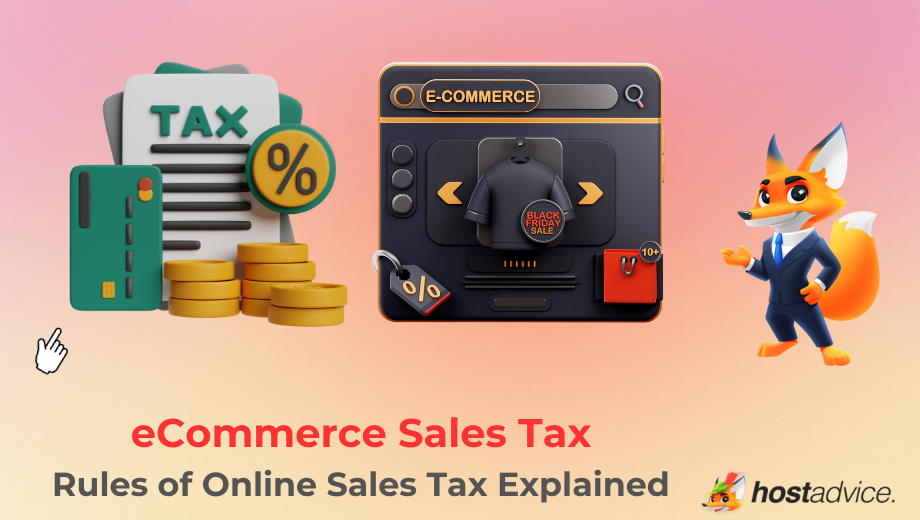
eCommerce sales tax refers to the levies imposed on digital transactions, impacting businesses selling products or services online. Tax obligations are part of daily life, as is shopping and selling online.
In this article, we will discuss eCommerce sales tax as it pertains to state and local governments, online sellers, and eCommerce businesses.
You will learn about state sales taxes and their complexities, shedding light on the rules and regulations that govern it, and providing valuable insights for businesses navigating this essential aspect of the digital marketplace.
- Understand where your business has a sales tax nexus to determine compliance obligations
- Maintain meticulous records of transactions, customer information, and tax calculations to ensure accuracy and compliance
- Leverage online sales tax calculators like TaxJar, Avalara, and Taxify for streamlined and accurate tax calculations
- Sales tax compliance is not just a legal necessity but a strategic advantage, fostering financial stability and customer trust in the dynamic eCommerce landscape
What Is eCommerce Sales Tax?
eCommerce sales tax is the monetary obligation imposed on digital transactions conducted by businesses selling products or services online.
This tax is akin to the traditional sales tax applied to in-person purchases but is specifically designed for transactions that occur in the digital marketplace.
As eCommerce continues to thrive, understanding and navigating the landscape of eCommerce sales tax is paramount for businesses to remain compliant and thrive online.
What Is the Sales Tax Nexus?
The sales tax nexus refers to the connection between a business and a state that obligates the business to collect and remit sales tax in that particular state.
In other words, sales tax nexus is the relationship between a business and the state the business is registered in. In the realm of eCommerce, the sales tax nexus is crucial because it determines which states an online seller is required to collect and remit sales tax in.
The connection to a state, or establishing a nexus, goes beyond just having a physical presence. US sales tax is not the same throughout the country; state sales tax laws are different and vary per state. eCommerce sales tax by state are different.
This economic nexus can also be triggered by economic activities such as reaching the economic nexus threshold, or a certain threshold of sales or transactions within a state.
How Does Sales Tax Work for eCommerce?
To understand sales tax in various types of eCommerce, first, we’ll answer two key questions about understanding the nuances of tax regulations.
Do you pay sales tax on online purchases in the US?
The answer is: yes. In the U.S., sales tax is a common component of online purchases.
However, the application of sales tax varies based on the state and local regulations. If your eCommerce business has a sales tax nexus in a specific state, you are generally required to collect and remit sales tax on transactions made within that state.
Does Your eCommerce Site Need to Collect Sales Tax?
Whether your eCommerce site needs to collect sales taxes depends on the concept of the sales tax nexus. If your business has a sufficient connection or nexus with a state, you are generally required to collect and remit sales tax on transactions made within that state.
The nexus can be established through various factors, including physical presence, economic activities, or other criteria set by the state.
Every online store should regularly assess their sales tax nexus, especially as regulations and sales tax rates can vary from state to state.
As your business grows, reaching new markets and customers, the nexus may expand, impacting your sales tax obligations. Staying informed about the sales tax nexus is key to ensuring compliance and avoiding potential legal issues.
Is There a Sales Tax on International Online Purchases?
In the U.S., sales tax is primarily governed by state and local regulations, and it generally applies to transactions occurring within the country. International online purchases, where the buyer is located outside the U.S., are typically not subject to U.S. sales tax. So there is not usually sales tax on international online purchases.
However, international tax laws and regulations vary, and some countries may have their own tax requirements for imported goods.
How Does Sales Tax Work for eCommerce?
Understanding the significance of eCommerce sales tax is important because businesses increasingly operate in the digital marketplace. Even if you do not have a physical business location, or are operating your business out of state, state’s tax laws still apply.
As a business owner, it can be complicated to figure out whose tax jurisdiction you are under. However, states will always collect tax from internet sales.
Missing Sales Tax Requirements Can Have Serious Consequences
Failure to comply with sales tax requirements and missing tax deadlines can result in serious consequences for stores that sell online. States are increasingly enforcing tax regulations, and non-compliance may lead to penalties, fines, or even legal action.
To pay taxes is not just a legal requirement but also a critical aspect of maintaining the financial health and sustainability of an eCommerce enterprise.
Sales Tax Is Essential for Economic Growth
A stable and well-maintained economic environment, supported by consistent revenue from state and local sales taxes, encourages investor confidence. Investors are more likely to support and invest in eCommerce businesses that operate in regions with robust financial infrastructures.
This, in turn, fosters business growth, innovation, and job opportunities within the digital marketplace.
Correct Sales Tax Is Good for Customer Relationships
Accurate and transparent application of sales tax is integral to building and maintaining positive customer relationships. Clear communication about sales tax, including its application and implications, helps establish trust with customers. In an era where transparency is valued, providing customers with a seamless and straightforward shopping experience, including transparent sales tax practices, contributes to customer satisfaction and loyalty.
Economic Nexus Law: eCommerce Sales Tax Rules by State
Navigating the landscape of eCommerce sales tax requires a keen understanding of economic nexus laws, which dictate the connection between a business and a state, influencing its obligation to collect and remit sales tax.
Let’s explore the nuances of economic nexus laws, shedding light on the specifics that eCommerce businesses need to know how to sell online.
Alabama eCommerce Sales Tax
Alabama’s economic nexus laws stipulate that businesses selling tangible personal property or engaging in retail sales of tangible personal property must collect and remit sales tax if their sales exceed a certain threshold. The specific threshold can vary, and businesses should regularly assess their sales volume to ensure compliance.
Alaska eCommerce Sales Tax
Alaska, being one of the few states with no statewide sales tax, allows local jurisdictions to impose their own sales tax. eCommerce businesses operating in Alaska should be aware of any local sales tax requirements that may apply based on their business activities.
Arizona eCommerce Sales Tax
In Arizona, economic nexus is triggered when a business exceeds a certain threshold of gross retail sales. Online sellers meeting this threshold are required to register for a transaction privilege tax (TPT) license and collect applicable sales tax on transactions made within the state.
Arkansas eCommerce Sales Tax
Arkansas imposes economic nexus on remote sellers whose gross revenue from sales exceeds a specified threshold. Businesses meeting this threshold must register for a sales tax permit and collect and remit sales tax on applicable transactions.
California eCommerce Sales Tax
California’s economic nexus laws require out-of-state sellers to collect and remit sales tax if their sales for delivery into the state surpass a certain threshold. Businesses meeting this threshold are obligated to register with the California Department of Tax and Fee Administration (CDTFA) and adhere to the state’s sales tax regulations.
Colorado eCommerce Sales Tax
Colorado enforces economic nexus for remote sellers with sales exceeding a designated threshold. Online businesses meeting this threshold must register for a sales tax permit and collect and remit sales tax on applicable transactions.
Connecticut eCommerce Sales Tax
In Connecticut, economic nexus is triggered for sellers with substantial economic presence, requiring them to collect and remit sales tax. The state considers factors such as gross receipts and the number of transactions to determine economic nexus.
Delaware eCommerce Sales Tax
Delaware, known for its absence of statewide sales tax, does not impose sales tax on eCommerce transactions. However, businesses should be aware of potential changes and local tax jurisdictions that may have their own regulations.
Florida eCommerce Sales Tax
Florida’s economic nexus laws require remote sellers with significant sales to collect and remit sales tax. The state considers factors like sales volume and the number of transactions to determine economic nexus.
Georgia eCommerce Sales Tax
In Georgia, economic nexus is established for remote sellers exceeding a certain sales threshold. Businesses meeting this criterion must register for a sales tax permit and comply with the state’s sales tax regulations.
Hawaii eCommerce Sales Tax
Hawaii enforces economic nexus for remote sellers with sales surpassing a specified threshold. Online businesses meeting this threshold must register for a general excise tax (GET) license and collect and remit the GET on applicable transactions.
Idaho eCommerce Sales Tax
Idaho’s economic nexus laws apply to remote sellers exceeding a certain sales threshold. Businesses meeting this threshold must register for a sales tax permit and collect and remit sales tax on transactions made within the state.
Illinois eCommerce Sales Tax
Illinois imposes economic nexus on remote sellers with significant sales. Businesses meeting the threshold must register for a state sales tax permit and adhere to the state’s sales tax regulations.
Indiana eCommerce Sales Tax
In Indiana, economic nexus is established for remote sellers surpassing a certain sales threshold. Businesses meeting this threshold must register for a sales tax permit and collect and remit sales tax on applicable transactions.
Iowa eCommerce Sales Tax
Iowa enforces economic nexus for remote sellers exceeding a specified sales threshold. Online businesses meeting this threshold must register for a sales tax permit and collect and remit sales tax on transactions made within the state.
Kansas eCommerce Sales Tax
Kansas’s economic nexus laws apply to remote sellers with significant sales. Businesses meeting the threshold must register for a sales tax permit and collect and remit sales tax on applicable transactions.
Kentucky eCommerce Sales Tax
In Kentucky, economic nexus is established for remote sellers exceeding a certain sales threshold. Businesses meeting this threshold must register for a sales tax permit and comply with the state’s sales tax regulations.
Louisiana eCommerce Sales Tax
Louisiana enforces economic nexus for remote sellers with sales surpassing a specified threshold. Online businesses meeting this threshold must register for a sales tax permit and collect and remit sales tax on applicable transactions.
Maine eCommerce Sales Tax
Maine’s economic nexus laws apply to remote sellers exceeding a certain sales threshold. Businesses meeting this threshold must register for a sales tax permit and adhere to the state’s sales tax regulations.
Maryland eCommerce Sales Tax
In Maryland, economic nexus is established for remote sellers with substantial sales. Businesses meeting the threshold must register for a sales tax permit and collect and remit sales tax on applicable transactions.
Massachusetts eCommerce Sales Tax
Massachusetts enforces economic nexus for remote sellers with sales surpassing a specified threshold. Online businesses meeting this threshold must register for a sales tax permit and collect and remit sales tax on transactions made within the state.
Michigan eCommerce Sales Tax
Michigan’s economic nexus laws apply to remote sellers exceeding a certain sales threshold. Businesses meeting this threshold must register for a sales tax permit and adhere to the state’s sales tax regulations.
Minnesota eCommerce Sales Tax
In Minnesota, economic nexus is established for remote sellers with significant sales. Businesses meeting the threshold must register for a sales tax permit and collect and remit sales tax on applicable transactions.
Mississippi eCommerce Sales Tax
Mississippi enforces economic nexus for remote sellers with sales surpassing a specified threshold. Online businesses meeting this threshold must register for a sales tax permit and collect and remit sales tax on applicable transactions.
Missouri eCommerce Sales Tax
Missouri’s economic nexus laws apply to remote sellers exceeding a certain sales threshold. Businesses meeting this threshold must register for a sales tax permit and adhere to the state’s sales tax regulations.
Montana eCommerce Sales Tax
Montana, known for its absence of statewide sales tax, does not impose sales tax on eCommerce transactions. However, businesses should be aware of potential changes and local tax jurisdictions that may have their own regulations.
Nebraska eCommerce Sales Tax
Nebraska enforces economic nexus for remote sellers with sales surpassing a specified threshold. Online businesses meeting this threshold must register for a sales tax permit and collect and remit sales tax on applicable transactions.
Nevada eCommerce Sales Tax
In Nevada, economic nexus is established for remote sellers with substantial sales. Businesses meeting the threshold must register for a sales tax permit and collect and remit sales tax on applicable transactions.
New Hampshire eCommerce Sales Tax
New Hampshire, known for its absence of statewide sales tax, does not impose sales tax on eCommerce transactions. However, businesses should be aware of potential changes and local tax jurisdictions that may have their own regulations.
New Jersey eCommerce Sales Tax
New Jersey’s economic nexus laws apply to remote sellers exceeding a certain sales threshold. Businesses meeting this threshold must register for a sales tax permit and adhere to the state’s sales tax regulations.
New Mexico eCommerce Sales Tax
In New Mexico, economic nexus is established for remote sellers surpassing a specified sales threshold. Online businesses meeting this threshold must register for a sales tax permit and collect and remit sales tax on transactions made within the state.
New York eCommerce Sales Tax
New York enforces economic nexus for remote sellers with sales exceeding a designated threshold. Businesses meeting this threshold must register for a sales tax permit and collect and remit sales tax on applicable transactions.
North Carolina eCommerce Sales Tax
North Carolina’s economic nexus laws apply to remote sellers exceeding a certain sales threshold. Businesses meeting this threshold must register for a sales tax permit and adhere to the state’s sales tax regulations.
North Dakota eCommerce Sales Tax
In North Dakota, economic nexus is established for remote sellers with substantial sales. Businesses meeting the threshold must register for a sales tax permit and collect and remit sales tax on applicable transactions.
Ohio eCommerce Sales Tax
Ohio enforces economic nexus for remote sellers with sales surpassing a specified threshold. Online businesses meeting this threshold must register for a sales tax permit and collect and remit sales tax on applicable transactions.
Oklahoma eCommerce Sales Tax
In Oklahoma, economic nexus is established for remote sellers with significant sales. Businesses meeting the threshold must register for a sales tax permit and adhere to the state’s sales tax regulations.
Oregon eCommerce Sales Tax
Oregon, known for its absence of statewide sales tax, does not impose sales tax on eCommerce transactions. However, businesses should be aware of potential changes and local tax jurisdictions that may have their own regulations.
Pennsylvania eCommerce Sales Tax
Pennsylvania’s economic nexus laws apply to remote sellers exceeding a certain sales threshold. Businesses meeting this threshold must register for a sales tax permit and adhere to the state’s sales tax regulations.
Rhode Island eCommerce Sales Tax
In Rhode Island, economic nexus is established for remote sellers with sales surpassing a specified threshold. Online businesses meeting this threshold must register for a sales tax permit and collect and remit sales tax on transactions made within the state.
South Carolina eCommerce Sales Tax
South Carolina enforces economic nexus for remote sellers with sales exceeding a designated threshold. Businesses meeting this threshold must register for a sales tax permit and collect and remit sales tax on applicable transactions.
South Dakota eCommerce Sales Tax
In South Dakota, economic nexus is established for remote sellers with significant sales. Businesses meeting the threshold must register for a sales tax permit and adhere to the state’s sales tax regulations.
Tennessee eCommerce Sales Tax
Tennessee’s economic nexus laws apply to remote sellers exceeding a certain sales threshold. Businesses meeting this threshold must register for a sales tax permit and collect and remit sales tax on applicable transactions.
Texas eCommerce Sales Tax
In Texas, economic nexus is established for remote sellers with sales surpassing a specified threshold. Online businesses meeting this threshold must register for a sales tax permit and collect and remit sales tax on transactions made within the state.
Utah eCommerce Sales Tax
Utah enforces economic nexus for remote sellers with significant sales. Businesses meeting the threshold must register for a sales tax permit and adhere to the state’s sales tax regulations.
Vermont eCommerce Sales Tax
In Vermont, economic nexus is established for remote sellers with sales exceeding a designated threshold. Businesses meeting this threshold must register for a sales tax permit and collect and remit sales tax on applicable transactions.
Virginia eCommerce Sales Tax
Virginia’s economic nexus laws apply to remote sellers exceeding a certain sales threshold. Businesses meeting this threshold must register for a sales tax permit and adhere to the state’s sales tax regulations.
Washington eCommerce Sales Tax
In Washington, economic nexus is established for remote sellers with substantial sales. Businesses meeting the threshold must register for a sales tax permit and collect and remit sales tax on applicable transactions.
West Virginia eCommerce Sales Tax
West Virginia enforces economic nexus for remote sellers with sales surpassing a specified threshold. Online businesses meeting this threshold must register for a sales tax permit and collect and remit sales tax on transactions made within the state.
Wisconsin eCommerce Sales Tax
In Wisconsin, economic nexus is established for remote sellers with significant sales. Businesses meeting the threshold must register for a sales tax permit and adhere to the state’s sales tax regulations.
Wyoming eCommerce Sales Tax
Wyoming’s economic nexus laws apply to remote sellers exceeding a certain sales threshold. Businesses meeting this threshold must register for a sales tax permit and collect and remit sales tax on applicable transactions.
Risks of Sales Tax Mismanagement
If you are a small business owner, being knowledgeable of sales tax regulations is important for compliance, but also to avoid severe consequences associated with mismanagement.
Here are the risks businesses may face if they fail to manage eCommerce sales tax solutions effectively:
- Late fees up to 10%: Failing to remit sales tax on time can result in late fees, often calculated as a percentage of the overdue amount. These fees can accumulate quickly, impacting the financial stability of the business.
- Outstanding interest: Late or unpaid sales tax amounts may accrue interest over time. The longer the delay in fulfilling tax obligations, the more significant the interest burden becomes, adding to the overall financial strain.
- Collection fees: States may impose collection fees on businesses that fail to comply with sales tax regulations. These additional fees further compound the financial challenges and can strain the resources of an eCommerce enterprise.
- Potential jail time in some states: In extreme cases of deliberate tax evasion or fraud, some states may pursue criminal charges, leading to potential jail time for responsible individuals within the business. While this consequence is rare, it underscores the importance of diligent sales tax management.
How to Charge Sales Tax in eCommerce: 13 Steps to eCommerce Sales Tax Compliance
Here are 13 essential steps to ensure proper collection and reporting of eCommerce sales tax:
- Determine Where You Have Sales Tax Nexus: Identify the states where your business has a sales tax nexus. This is the starting point for understanding your sales tax obligations.
- Register for a Sales Tax Permit: Obtain a license to sell online in each state where you have a nexus. This permit allows you to collect and remit sales tax legally.
- Understand Sales Tax Exemptions: Familiarize yourself with various sales tax exemptions, including nonprofit exemptions, wholesale and reseller exemptions, sales tax holidays, and product exemptions.
- Understand How to Calculate Sales Tax on eCommerce: Learn the intricacies of calculating sales tax based on each state’s regulations and rates.
- Set Up Sales Tax Collection on Your Online Shopping Carts: Configure your online shopping carts to automatically calculate and collect the correct sales tax at the point of purchase.
- Keep Meticulous Documentation: Maintain thorough records of all sales transactions, including customer information, purchase details, and tax collected.
- Report How Much Sales Tax You Collected: Regularly report the amount of sales tax collected in each state to the respective tax authorities.
How to Calculate Sales Tax in eCommerce?
Online Sales Tax Calculators: Utilize online sales tax calculators to simplify the process. Here are some reliable tools.
- File Your Sales Tax Returns: Submit sales tax returns on time, accurately reflecting the sales tax collected and any exemptions applied.
- Create a Visible Schedule for Sales Tax Returns: Establish a clear schedule for filing sales tax returns to ensure timely compliance.
- Consider Using eCommerce Sales Tax Software: Invest in eCommerce sales tax software to automate calculations, streamline compliance, and minimize the risk of errors.
- Check and Double Check Your Compliance: Regularly review your sales tax processes and documentation to ensure ongoing compliance.
- Stay Up to Date on State Sales Tax Laws: Monitor changes in state sales tax laws and adjust your practices accordingly to stay compliant.
- Consult an Expert If Needed: When in doubt or facing complex situations, seek guidance from tax professionals or experts in eCommerce sales tax.
Final Word: Turn Sales Tax Compliance Into an Advantage for Your Online Business
For any eCommerce store, mastering sales tax compliance is not just a legal necessity but a strategic advantage.
By understanding and implementing the intricacies of sales tax management, businesses can ensure financial stability, build customer trust, and navigate the ever-evolving regulatory environment.
Start your eCommerce business and make the decision to turn sales tax compliance into a competitive edge for your eCommerce success.
Next Steps: What Now?
- Start building your online business: explore the best eCommerce platforms to launch your business and start selling online.
- Host your new online business: Already built your website? Now it needs to go live. Learn about the top eCommerce hosting platforms.
Learn More About eCommerce
- How to Build an eCommerce Website: From Idea to Launch
- How To Create an eCommerce Website Using WordPress
- eCommerce Website Cost
- Strategies for eCommerce Marketing in a Competitive Market
- The Challenges of eCommerce and How to Overcome Them
- eCommerce Website Design: Best Practices and Examples
- eCommerce Migration and Replatforming Guide
- How to Use Machine Learning for eCommerce (with Benefits and Tips)
- Evaluating Enterprise eCommerce Platforms: Features, Pros and Cons
- SEO for eCommerce Sites: A Step-by-Step Guide (+ Tips)
- Supply Chain Management in eCommerce: A Complete Guide
- eCommerce Inventory Management Guide (with Tips & Tools)
- eCommerce Automation: How It Works (plus Tools and Benefits)
- 25 Ways to Use AI in eCommerce (with Examples & Tips)
- Is eCommerce Profitable? Here’s What You Need to Know
- 20 eCommerce Business Ideas (+ Next Steps)
- eCommerce Personalization Guide with Benefits, Examples, & Tips







